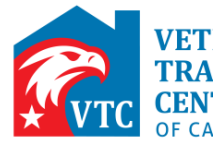Each Veteran’s journey with VTC is supported by personalized, client-centered case management, where our dedicated case managers develop tailored recovery programs addressing medical, psychological, financial, and social needs. Our comprehensive services go beyond housing, offering essentials such as food, clothing, transportation, mental health counseling, substance abuse recovery, employment resources, and more. VTC’s holistic approach ensures that Veterans are not only housed but are ... Lire la suite
Each Veteran’s journey with VTC is supported by personalized, client-centered case management, where our dedicated case managers develop tailored recovery programs addressing medical, psychological, financial, and social needs. Our comprehensive services go beyond housing, offering essentials such as food, clothing, transportation, mental health counseling, substance abuse recovery, employment resources, and more. VTC’s holistic approach ensures that Veterans are not only housed but are provided with the tools and support needed to build sustainable, fulfilling futures. Since its founding, VTC has served over 20,000 veterans with housing or supportive services.
VTC was founded in 1996 on historic Fort Ord. Recognized as a non-profit in 1997, VTC began housing its first homeless veterans after renovating former Fort Ord non-commissioned officer housing in 1998. In 2001, we housed 12 veterans. As funding came in, we steadily increased our capacity to 58 beds in 2017. In 2020, we addressed an underserved demographic of veterans, those being the paroled veteran community experiencing homelessness and lack of supporting services. With more funding, we increased our capacity to meet this need whereas in 2024, we have 122 beds. In 2022, VTC began the first of its kind entire prison yard dedicated to veteran rehabilitation. VTC provides rehabilitation at the prison and then houses the veterans with supportive services upon release. VTC has a 0% recidivism rate compared to California 41.9% because of these services.
The need for homeless and low-income housing for veterans is still ongoing. We completed construction on Lightfighter Village, a 71-unit apartment complex dedicated to this need in January 2025. VTC also started construction on two four-bedroom ADA compliant Accessory Dwelling Units that will be completed by May 2025. Despite our ongoing efforts, the need for housing homeless veterans continues.
Our supporting objectives are to provide immediate housing, mental health services, addiction recovery services, and sustainable income through employment or service-connected benefits.
VTC uses evidence-based methods and a housing-first model that welcomes veterans irrespective of their discharge status and accommodates their families and pets. Our inclusive services cater to all veterans, including those recently released to parole, offering immediate access to clothing and a food pantry open five days a week. Veterans are paired with case managers to create individualized recovery plans, starting with essential needs, and progressing through comprehensive empowerment services.
Caseworkers provide crucial system navigation support, meeting weekly with Veterans to ensure they can access and benefit from the resources available to them, including healthcare, housing, and education, and connecting them with any veteran benefits they are eligible for. They also meet weekly to chart progress and adapt programming needs to any challenges the veteran is facing.
VTC provides integrated care for PTSD, suicide prevention, and substance use disorders through a holistic approach that combines mental and physical health care with peer support. Our on-site Licensed Case Social Worker offers mental health counseling and dialectical behavior therapy alongside addiction recovery groups, including a unique narration therapy using Shakespeare. We also support AA/NA services for both veterans and active-duty personnel and facilitate access to appointments and employment or educational opportunities through transportation assistance, including bus passes and electric bikes.
Our job placement and education services, developed through strong partnerships with local businesses and colleges, are instrumental in helping veterans secure stable employment, a key factor in their mental health and reintegration into society. We provide veterans with the tools they need to achieve economic independence and avoid returning to environments that contributed to their initial struggles.
VTC’s food pantry is also available to homeless and low-income veterans. As more veterans and active-duty military come to this area, the need for food security has increased. VTC has expanded its capacity for food disbursement and donations. This has resulted in an increase from 450 visits per month to over 1000.
VTC employs a rigorous evaluation process using both qualitative and quantitative methods to gauge program effectiveness, collecting data through client intake forms, service records, and follow-up surveys. This data helps assess key performance indicators like housing stability, employment, mental health, and veteran well-being, and is shared with the Department of Veterans Affairs, CDCR, and the Monterey County Coalition of Homeless Service Providers to ensure continuous improvement.
The staff at the Veterans Transition Center of California (VTC) is highly qualified, holding a range of degrees from PhDs to AAs across more than 32 certified fields including mental health and addiction, and embodying a wealth of experience with over 300 years of collective service to veterans and military personnel; 44% of our staff are also veterans. Our team of 32 full-time and five part-time employees reflects the diverse backgrounds of the veterans we serve, coming from all federally protected classes. Additionally, VTC collaborates with over 300 volunteers annually to further our mission. All services are provided at no cost to the veteran.
Cacher le texte au complet